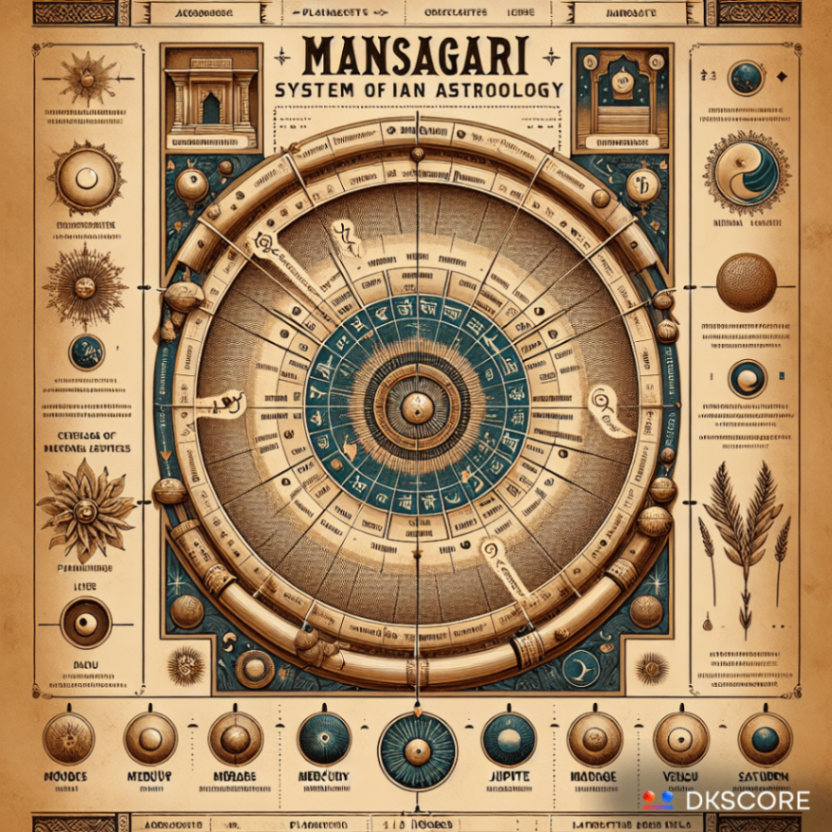The Karma Framework in Vedic Thought
Sanchita Karma is the entire karmic storehouse.
Prarabdha Karma is the portion now active and non-negotiable.
Kriyamana/Agami Karma is what you are creating through current actions.
You do not control what must arise (Prarabdha).
You control how you respond (Kriyamana). That response reshapes the road ahead in subtle but real ways.
The Sixth House: The Engine Room of Prarabdha
Classics (e.g., Bṛhat Parāśara Horā Śāstra) assign the Sixth House to ṛṇa (debts), ṛpu (enemies), roga (disease). It is the ledger and collection desk of Prarabdha Karma.
Planets in the Sixth House describe the type of dues.
The Sixth lord shows where and through what field dues are collected.
The nakshatra of the Sixth lord shows the style of collection.
The nakshatra lord (dispositor) shows who/what agency finally enforces payment.
Upachaya houses (3/6/10/11) reward effort. You clear dues fastest with skills, routines, decisions, and networks—built steadily, not theatrically.
Free Will vs Destiny: Where You Can Move the Needle
Destiny frames the test; free will writes your answer sheet.
Third House → learn, practice, communicate.
Sixth House → show up daily; accept dues with dignity.
Tenth House → take accountable decisions; act in daylight.
Eleventh House → build the right circles; enforce fair rules.
When these four run well, Prarabdha Karma turns into capability rather than crisis.
Leadership, Authority, and the Price of the Tenth
Authority (10th) is earned by handling weight others avoid.
Malefics here can forge resilient leaders—if ethics, documentation, and process stay tight.
Expect resistance, visibility, and hard calls.
Pay on time, credit contributors, and face conflict cleanly; this prevents new Kriyamana from becoming tomorrow’s dues.
Ancestral Karma: Honoring the Line and Healing the Future
Ancestral karma often appears when 2nd/8th connect with the 6th or when Magha, Dwadasamsa (D12), or 12th-house patterns speak up.
Simple, consistent acts—gratitude, food/essentials charity, evening til-oil lamp, and respectful remembrance—lighten the load without drama, especially around Pitru Paksha.
Classical Anchors (concise)
BPHS / Phaladīpikā / Bṛhat Jātaka: 6th = ṛṇa-ṛpu-roga; malefics here can grant victory after struggle; Viparīta Rājayoga (6/8/12 lords in dusthanas) transforms trouble into rise.
Jaimini: use rāśi dṛṣṭi, Arūḍha (A6) for visible debt/enemy narratives, and 6th from Ātmakāraka for how the soul engages toil and the ṣaḍ-ripu.
Divisional charts: D6 (disease/debt detail), D12 (ancestors), D30/D60 (subtle residue).
How the 6th Lord Pays Dues (by house placement)
6L in 1st: health, stamina, self-discipline.
6L in 2nd: food, speech, family finance; plug leaks.
6L in 3rd: paperwork, skills, siblings; exam-like phases.
6L in 4th: home/land/emotional peace; property costs.
6L in 5th: study/children/speculation responsibility.
6L in 6th: head-on clearing; win through grind + ethics.
6L in 7th: partners/contracts; boundaries must be explicit.
6L in 8th: crisis tuition; secrecy, insurance, backups.
6L in 9th: beliefs/mentors/travel; humble learning.
6L in 10th: public duty; hard calls under scrutiny.
6L in 11th: group politics; rules, audits, vetoes.
6L in 12th: expense/foreign/retreat; mindful closure.
The Big Unlock: 6th-Lord Nakshatra & Nakshatra Lord
The nakshatra gives how; the nakshatra lord gives who/where/when the dues are actually collected.
Deva-gana (e.g., Pushya, Uttara Phalguni, Revati): caretaking, guardianship.
Manushya-gana (e.g., Hasta, Swati, Anuradha): craft, negotiation, loyalty.
Rakshasa-gana (e.g., Ardra, Jyeshtha, Mūla): deep pruning, power tests.
Examples of śakti cues: Krittika (purify/burn) → detox + strict boundaries; Punarvasu (renew) → reset cycles; Shatabhisha (heal) → diagnostics/data; Anuradha (devotion) → team-karma; Purva Bhadra (tapas) → austerity; Magha (ancestral throne) → clear Ancestral Karma.
Timing Windows (when Prarabdha speaks up)
Dasha/Antardasha of the 6th lord, planets placed in 6th, the nakshatra lord of the 6th lord, or the sign lord hosting them.
Transits of Saturn/Rahu/Ketu/Mars over the 6th cusp, 6th lord, or the nakshatra lord.
New/Full Moons on the 6th lord’s nakshatra open 2–3 day micro-windows for inflection.
Mini Effects Grid: Planets as Sixth Lord (tone of dues + clean payment)
Sun: dues via authority/ego/heart; pay with honest leadership, father/mentor respect, taxes.
Moon: family/moods/fluids; pay with caregiving, food charity, sleep hygiene.
Mars: injury/conflict; pay with disciplined physical work and precision, not anger.
Mercury: documents/deals; pay with learning, reviews, and daily mantras (e.g., Vishnu Sahasranama).
Jupiter: advisers/ethics/teaching dues; pay with scholarships/teaching/spiritual study.
Venus: agreements/comforts; pay with fair contracts and relationship hygiene.
Saturn: delay/duty/process; pay with punctual service and long-haul consistency.
Rahu: foreign/tech/viral; pay with compliance, evidence, and mentorship.
Ketu: detach/ends; pay with simplicity, meditation, animal/temple seva.
Remedies—Stacked by Dispositor Chain (repeatable & specific)
Planet in 6th → sign lord → nakshatra lord: give each a small daily act.
Match remedy type to śakti and gana: caretaking vs pruning vs discipline.
Keep an Upachaya engine running (3/6/10/11): learn → grind → decide → organize.
For Ancestral Karma signals (Magha/2-8-6 links/D12): gratitude rites, food/essentials charity, evening til-oil diya; steady > spectacular.
Dispositor Chain (Worked, Anonymized Example)
Chart architecture (anonymized but structurally exact):
Sixth House in Aquarius with Moon (Dhanishta – Mars), Jupiter (Shatabhisha – Rahu), Venus (Shatabhisha – Rahu).
Sixth lord (Saturn) is also 5th lord. Saturn sits in the 10th House (Gemini) with Mars.
Both Saturn and Mars occupy Mrigashira (Mars’ nakshatra) in Gemini.
Mercury (Ascendant and 10th lord) is in Uttara Bhadrapada (Saturn’s nakshatra).
Step-wise chain (who hands the file to whom):
6th lord Saturn sits in Gemini → sign dispositor Mercury.
Saturn’s nakshatra is Mrigashira → nakshatra lord Mars.
Mars is in Gemini → sign dispositor Mercury again.
Mercury is in Uttara Bhadrapada → nakshatra lord Saturn.
Result: a closed loop: Saturn → Mars → Mercury → Saturn.
Meaning, in plain language:
Saturn (6th lord) ensures dues are collected publicly in the 10th—through work, authority, and accountability.
Mars (nakshatra lord) demands conflict competence: cut confusion, act decisively, and handle crises without vendetta.
Mercury (sign dispositor of Saturn & Mars) insists on documents, logic, and process: contracts, minutes, audits, and clear communication.
The loop returns to Saturn: dues repeat until discipline, time-keeping, and ethical structure are mastered. The cycle turns into a ladder once these are non-negotiable habits.
Extra weight from planets actually in the Sixth (Aquarius):
Moon in Dhanishta (Mars): emotional steadiness in teams; pay dues through reliable rhythm and shared effort.
Jupiter & Venus in Shatabhisha (Rahu): healing through systems, compliance, and data; dues appear in collective settings, unconventional networks, or tech/medical contexts.
Net synthesis:
Career/authority is the karmic theater (10th). The collection agencies are Saturn (duty/process), Mars (decisive action), Mercury (documents/logic), with Rahu and Mars flavoring the Sixth-house themes themselves.
When these agencies align—clean paperwork, timely decisions, disciplined schedules—the same loop that once pressed you becomes a repeatable operating system for leadership.
Practical, Evergreen Workflow (apply to any chart)
Find 6th sign, 6th lord, and planets in 6th.
Trace 6th lord’s sign lord (dispositor) and nakshatra lord.
Add who sits in 6th and their nakshatras (their lords become co-collectors).
Synthesize a one-line chain (e.g., “Saturn → Mars → Mercury → Saturn”).
Map where each link lives (house/sign) to know where dues show up.
Keep the Upachaya engine on: skill → routine → decisions → networks.
Closing Insight
Prarabdha Karma is not a punishment; it is a settlement plan.
The Sixth House shows the bill. The 6th lord and its nakshatra lord show the collector and the method. Your free will—expressed through Upachaya effort—decides whether the same loop stays a trap or becomes your training ground for calm, capable leadership.






































